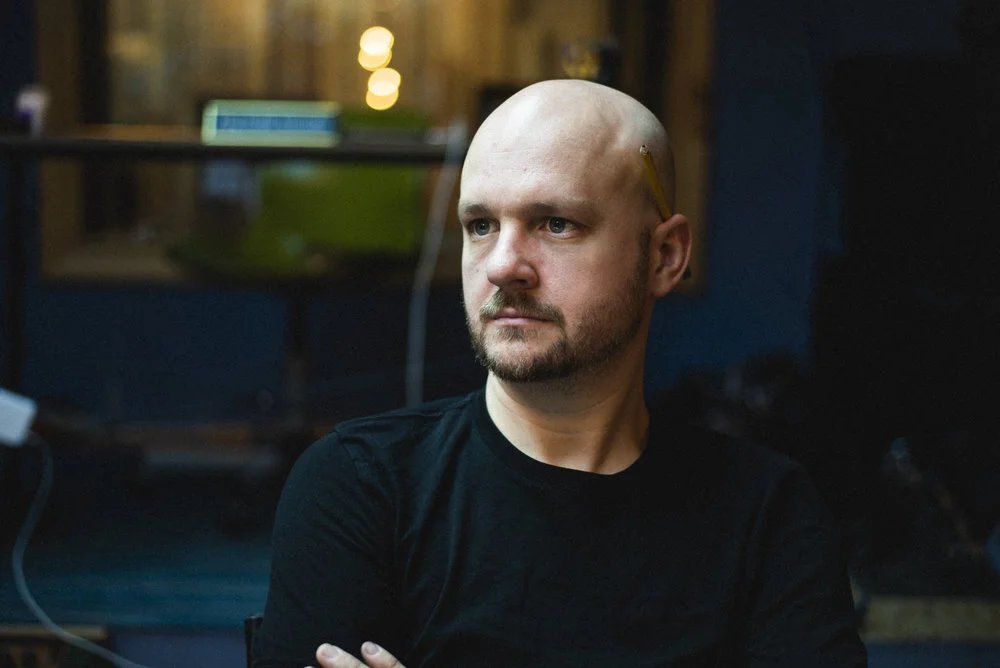In Flowers Through Space is a conceptual album based on the Fibonacci sequence of numbers—a spiraling mathematical formula which is seen in flower petals throughout the natural world and has historically been associated with beauty. Using the recording studio as an instrument, the project is commandeered by innovative New York City-based composer, producer and audio engineer E Scott Lindner, who challenges an ensemble cast of revered modern jazz and classical musicians to improvise and interpret his cinematic visions. The result is an album that weaves together themes of mystery, nature and science, and takes form as equal parts celestial jazz journey and progressive classical music experience. “The Fibonacci sequence translates to the human brain as beauty,” says Lindner. “I thought it would be interesting to try and make a record that was entirely ‘Fibonaccized’—which is a word I made up—and see if it ended up being beautiful.”
Recorded at Lindner’s Pinch Recording studio in New York City, the number of musicians on each song on the album increases to mirror the Fibonacci sequence—which opens with 0, 1, 1, 2, 3, 5, 8, 13, 21—and studio sessions were held on dates featuring in the Fibonacci. Computer code was also created to translate Fibonacci numbers into musical note frequencies, which in turn inspired the scales used throughout the project. “This is the most complex and emotional album I've made and it's completely guided by this mathematical construct," says Lindner. Alongside the album, a documentary will be released to showcase the emotionally charged and creatively demanding recording experience.
The album opens with "0," a coy introduction in the lineage of John Cage's “4'33" that features the ambient background noise of an empty studio to represent a song with zero musicians. It's followed by "1 (n1)," which becomes the source code for the project: Adam Ahuja's elegiac piano lines correspond to numbers in the Fibonacci sequence, establishing the baseline parameters for the album. As Lindner pairs musicians together—in combinations inspired by the setup of classical chamber ensembles—they are challenged to step out of their comfort zones and reinterpret his stream-of-consciousness written notes describing the emotional feel of each song. On "2," Tomoko Omura's violin and Andrew Gould’s flute convey a sense of intimate vulnerability inspired by Lindner’s scenario of a lonesome protagonist rediscovering a sense of hope as she strolls through a renaissance faire. The album’s epic closing song “21” adds a choir to the cast to evoke Lindner’s fantastical image of “James Bond and Willy Wonka journeying through the universe on a magical journey of discovery and dream."
Originally establishing himself as a guitar player and leading force in the psychedelic-leaning krautrock-styled group The Static Rising back in 2007, Lindner’s approach to creating music has evolved into “using the studio as an instrument.” While creating In Flowers Through Space, he embraced a big picture view: “The playing of an instrument is such a specific part, but I wanted this to be broader and focus on feelings rather than specific chords.” Albums including King Crimson's Islands and Can's Future Days, plus Mozart's “Requiem” and Kamasi Washington's sweeping jazz soundscapes, became reference points for the type of feelings Lindner wanted to express across the album. As clusters of musicians passed through Pinch Recording to interpret Lindner's notes—and composed their parts in a scramble situation on the spot in the same room—he conducted the grand musical direction from the studio’s control room, offering live cues to shape the sound.
In Flowers Through Space follows Lindner's 2017 self-titled solo debut—which spotlighted his own guitar playing and was entirely recorded over three days—and 2018's orchestral-infused Port Of Dreams, which marked Lindner's inaugural attempt to "use engineering as a way to express myself." The foundation of Lindner's expertise in audio engineering was formed by a mix of graduating the Sheffield Institute for the Recordings Arts in Maryland and working at Right Track Recording studio in Manhattan, where he assisted on songs by Shakira, Pat Metheny, David Bowie, Mariah Carey and a stream of hip-hop artists including Pharrell Williams's production unit The Neptunes, Fabolous and DJ Clue. After official business, Lindner would explore the intricacies of the studio until the early hours of the morning, refining his recording skills and discovering fresh ways to manipulate sound. In 2007, Lindner founded and began running the Studio Radio 45 facility in Queens, before graduating to opening Pinch Recording in 2017, which now acts as a home base for his own projects.
Lindner's commitment to pushing the dynamics of capturing and shaping sound comes to a fore on In Flowers Through Space. The album combines the thrilling exploratory instincts of a free-spirited improv jazz session with a compositional structure determined by mathematics. "I wanted the Fibonacci sequence to inspire, inform and also limit," says Lindner, encapsulating the heart of an album that charters new territory into the future while being solemnly rooted in the past.










